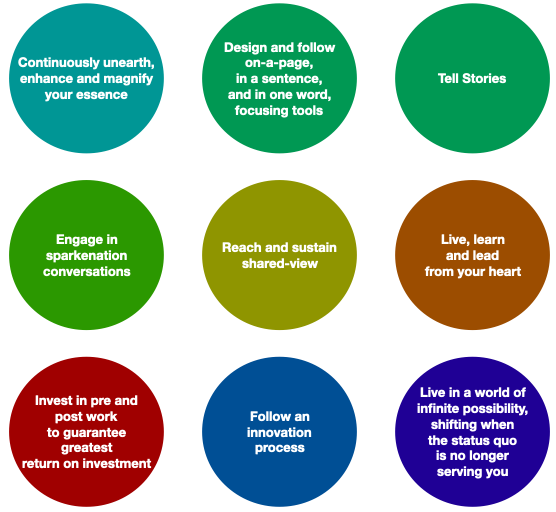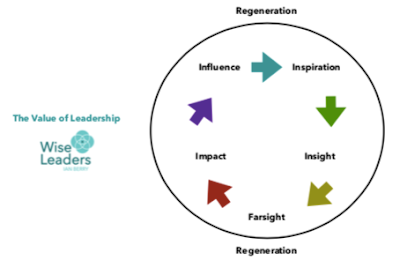I've had the great honour and privilege since 1990 to be in the room with more than a million people as a professional speaker. Audiences have been as small as 5 people and as large as 5000 people.
Half of my 3000+ presentations have been in the smaller (5 - 50 people) workshop, breakout, and peer group settings, where I have been able to observe and interact the most and therefore learn the most.
Since 2012 I've specialised in hosting human being centred conversations with groups of three to nine people. Since 2018 these have mostly been online.
In Wise Leaders Community this means weekly and monthly interaction with the same people. Wise Leaders Community is the current name of what has been several incarnations since I began working with peer groups in 1985. Many clients have been engaged for a decade and some for longer.
The following nine pursuits are where members of Wise Leaders Community are giving and focusing their energy in their own best way.
1. Continuously unearth, enhance and magnify your essence
Voice, song and music are my favourite metaphors for our essence, our unique personal significance or one-of-a-kind character.
For me a key role of people leadership is the art of seeing, sometimes unearthing, mostly magnifying and enhancing people's essence including your own.
Learn more via this four minutes and 50 seconds podcast.
2. Design and follow on-a-page, in a sentence, and in one word, focusing tools
I updated overviews of these three tools two days ago here.
3. Tell Stories
One of my signature programs is The We Need To Talk Experience. It follows a proven process:
I kick off each episode of We Need To Talk with a story. Prior to the story I make the following statement which has been my presentation opening line for over twenty years.Following my story participants share what they heard themselves say to themselves and then some share a story themselves which leads to further conversation.
This combination of stories and conversations is profound and leads to appropriate action decisions for individuals.
Help is then available as people implement their decisions as well as integrate new learnings with what is already working well.
4. Engage in sparkenation conversations
I coined the term sparkenation in my 2011 book Changing What's Normal. Sparkenation - a spark that ignites passion that leads to action that changes what's normal.
I believe that most of us hang on to the status quo (normal) for too long when it is no longer serving us.
For me sameness is the enemy of significance if it is not serving our best interests and enabling us to live and work in the service of others.
Sparkenation conversations are a hallmark of our work at Wise Leaders Community. There are 48 (as I write this) recorded sparkenation conversations on my YouTube channel here.
To get Storytelling Sparkenation Conversations happening at your workplace, community group, sports club or in your team/cohort please give me a call on +61 418 807 898 and we will begin to design and implement a program together.
5. Reach and sustain shared-view
Most of our troubles, personal, local, organisational, national, and international, are fundamentally based in our perceived need to hang onto the world in here (my view), our issues with the world out there (other people's views), and, our failure to focus more on the world we share (ours).
The exciting news is that when we find and sustain shared-view (ours) we can triumph over all our troubles.
There's a complimentary online course here that enables you to take action on each of the twelve areas of significance of shared-view.
6. Live, learn and lead from your heart
Heart-Leadership is my latest solo book.
A companion to the book is 28 complimentary videos that you will find here that will help you to live, learn and lead from your heart. 24 of the videos are under five minutes. You will find short and sharp podcasts at the link too.
7. Invest in pre and post work to guarantee greatest return on investment
In 2005 I began applying research completed in 2004 by Dr. Brent Peterson from Columbia University.
He found that 50% of learning happens after an event and 26% prior to an event.
The consequences of applying this research have been profound for my clients.
Learn more about this here. Then apply in your own best way.8. Follow an innovation process
I created an eight stage process to help my clients to learn and take action.
It’s turned into a way to guarantee innovation and progress.
It’s also a track I use regardless of the kind of work I’m doing or the event I’m conducting.
I’m taking people on a journey from information to insight to inspiration to idea/s to implementation to introspection to integration to innovation. This is my fundamental methodology.
There's a four minutes and 22 seconds podcast about this here.
More recently I have combined the pre and post concept with my 8 stages to innovation methodology. There's an article about this here.
I highly recommend this combined process.
9. Live in a world of infinite possibility, shifting when the status quo is no longer serving you
There's a two minutes and forty-six seconds podcast here.
Here is the accompanying blog post.
In the blog I recommend two actions:
I recommend two actions 1) Watch and/or listen to the Seth Godin piece on possibility and enrollment.
2) Undertake my Shifting from reality (what is) to Possibility (What Can Be) exercise. This will help greatly with enrollment.
Become the wise leader you want to be.
Ian



















